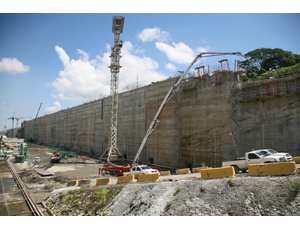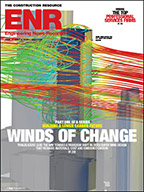
Less than a day after both sides pledged to work together to resolve a disagreement threatening to stop work on the $5.2-billion Panama Canal Third Lane Expansion, project owner the Panama Canal Authority and Grupo Unidos por El Canal, its joint-venture contractor, once again hardened their stances on the cost overrun dispute.
In a Jan. 8 statement, Italy’s Salini Impregilo S.p.A., a member of the GUPC consortium that is building the new locks for the waterway, reiterated an immediate need for the authority to provide an additional $1 billion in funds set aside for contingencies and unforeseen circumstances immediately.
“The consortium of builders is not a charity and there is no reason to make them pay part of the costs of carrying the channel,” said the firm in the statement. “The position taken by the ACP can only be explained by the inexperience of [its] managers in carrying out work of this size and complexity.”
The demands listed in the statement reflected those presented to the authority at the end of December that included a threat to stop work on Jan. 20 if no progress was made to meet them.
The authority and its contractors had met on Jan. 7 to discuss a new proposal to keep work on track.
ACP has indicated that lifting the stop-work threat is a prerequisite for any action on the matter, but the consortium has yet to do so.
In comments to Panama's National Assembly on Jan. 8, ACP Administrator Jorge Quijano described the new proposal as “impossible.”
The builders "are completely outside the contract and that's not going to happen,” he told the legislators.
ACP has repeatedly insisted that the contractor follow a three-step, dispute-settlement process stipulated in its contract that involves an authority review, an evaluation by a dispute adjudication board and a ruling by the International Chamber of Commerce in Miami.
To date, GUPC has filed 13 claims valued at nearly $1.4 billion and has reported 89 intentions to claim that have not been formally initiated, its says.
GUPC says in its latest statement that the ACP routinely rejects every claim, forcing the consortium to bear the growing cost overruns while the arbitration process continues.
“It is clear that such a claim is totally unacceptable and even ridiculous in the current dramatic emergency,” the firms say.
In past interviews, Quijando has said that the authority has considered alternative plans to completing the canal expansion in the event GUPC walks away from the job.
According to the admininistrator, the ACP has $1.3 billion that can be made available to continue work.
Quijando said that ACP officials have already met with representatives of Zurich Insurance Group, which hold several bonds and insurance policies related to the expansion.
According to the authority, Zurich holds a $400-million performance bond and a $50-million payment bond related to the locks work.
In November, the company issued a $600-million surety bond in support of the the contractor group with the ACP as the beneficiary.
Consortium officials warned that contract termination would imperil the project—driving up completion costs, delaying the opening and subjecting the authority to damages when arbitration of claims is completed.
“A termination of the contract implies not only that the execution cost may double or triple but that the new contrator could not guarantee the technical design and operation offered by the GUPC today,” said Paolo Moder, a member of the contractor group's board of directors, in a presentation earlier this week.



Post a comment to this article
Report Abusive Comment